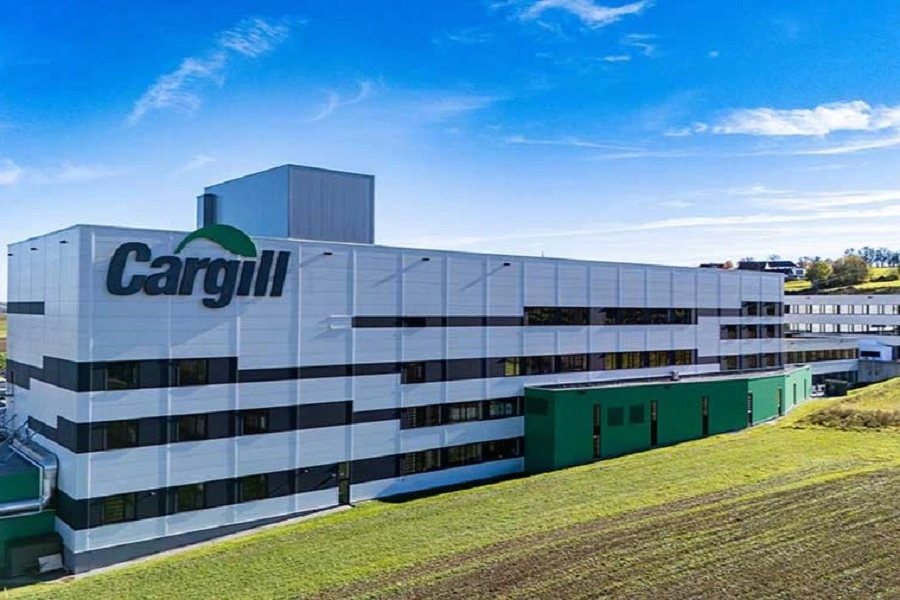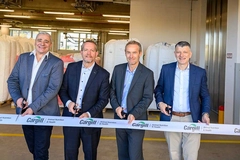
- Industry news
Industry news
- Category news
Category news
- Reports
- Key trends
- Multimedia
- Journal
- Events
- Suppliers
- Home
- Industry news
Industry news
- Category news
Category news
- Reports
- Key trends
- Multimedia
- Events
- Suppliers
Key takeaways
- Cargill expands production by 50% at its Engerwitzdorf, Austria, facility to meet growing demand for micronutrition feed solutions.
- The upgrade enhances automation, worker safety, and sustainability, with 100% renewable energy use and new silos.
- The site supports Cargill’s Micronutrition & Health Solutions business to deliver science-based, microbiome-focused animal nutrition.
Cargill Animal Nutrition & Health (ANH) has expanded its Engerwitzdorf, Austria, facility to increase its micronutrition solution production capacity by 50%. The upgraded facility boosts the production of feed solutions that “maximize productivity and promote digestive health,” by focusing on a deep understanding of each microelement for precise and effective ingredients.
The site will produce up to 30,000 metric tons per year, enough to fortify up to 200 million metric tons of feed, says Cargill.
The expansion supports the company’s rapidly growing Micronutrition & Health Solutions business, launched in 2024, which unites the expertise of animal nutrition firms Diamond V, Delacon, and Provimi. Cargill acquired these companies over the last decade.
This integrated business has reported double-digit growth for three consecutive years owing to livestock producers adopting “science-based” nutrition solutions to enhance performance, protect animal health, and preserve resources.
“Our Micronutrition & Health Solutions business is a culmination of our industry-leading capabilities across phytogenics, postbiotics, anti-mycotoxin agents, enzymes, and other performance-enhancing nutrition solutions,” says Gilles Houdart, global head of the Micronutrition & Health Solutions business.
“This investment in our facility not only allows us to increase production capacity, but it also allows us to work more safely, operate more efficiently, and produce more sustainably.”
Leveraging automation
The ingredients leader unveiled the Engerwitzdorf facility in 2020 with two large silos, which it is now expanding to eight. To accommodate the higher throughput, it has implemented extensive technological upgrades emphasizing automation, safety, and environmental responsibility.
 Cargill says 90% of the labor across picking, mixing, and loading at the site is automated.Automation accounts for approximately 90% of operations across picking, mixing, and loading. An on-site lab conducts over 25,000 analyses annually to ensure the consistent quality of raw materials, intermediates, and finished products.
Cargill says 90% of the labor across picking, mixing, and loading at the site is automated.Automation accounts for approximately 90% of operations across picking, mixing, and loading. An on-site lab conducts over 25,000 analyses annually to ensure the consistent quality of raw materials, intermediates, and finished products.
Michael Fischer, manufacturing and supply chain lead for the Micronutrition & Health Solutions business, stresses that automation is transforming how the firm operates, “enhancing worker safety and enabling our teams to deliver more volume with greater precision every day.”
“It’s a substantial leap forward in how we’re able to test and produce the solutions that support animal health and performance around the world.”
Prioritizing worker safety and sustainability
Safety innovations at the facility include fully automated narrow-aisle forklifts to separate people from moving equipment, and a built-in compressor system that minimizes dust, noise exposure, and other environmental hazards for workers.
The company also emphasizes sustainability benefits, such as the site operating on 100% renewable energy. This focus includes nearly 70% of daily operations using hydropower for energy and 30% from solar, while a biomass heating system utilizes locally sourced wood chips.
Last year, Cargill strengthened its US animal nutrition presence with feed mill acquisitions in Denver, Colorado, and Kansas City, Missouri (US).
Within its animal supply chain, the company works with farmers on carbon sequestration, grazing techniques, and innovative new approaches for feed, which are expected to reduce GHGs by 30%, CTO Florian Schattenmann previously told Food Ingredients First.












